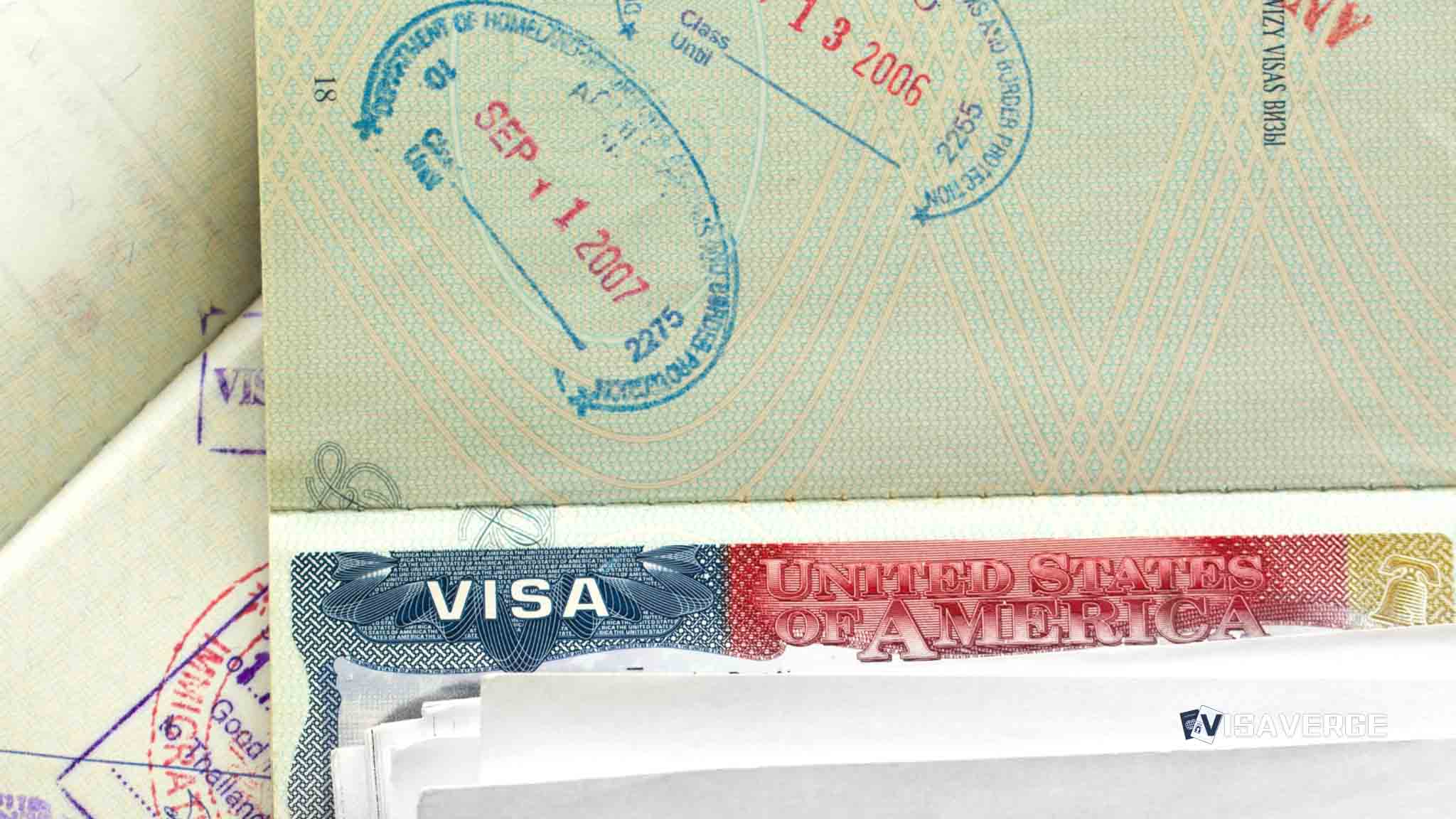If you are currently studying in the United States on an M1 visa and you want to explore different avenues that might help you gain exposure to the cultural and business facets of the country, transferring to an O3 visa could be an option worth considering. However, it’s crucial to understand the process and weigh the advantages and disadvantages before making a decision.
Understanding M1 and O3 Visas
The M1 visa is a type of non-immigrant visa for international students enrolled in vocational and technical schools. While it allows you to gain specialized skills in the US, your activities are limited strictly to your course of study and immediate employment within that field under certain conditions.
On the other hand, an O3 visa is issued to dependents of O1 visa holders who possess extraordinary abilities in the fields of science, arts, education, business, or athletics, or O2 visa holders who accompany them to assist in specific events or performances. The O3 visa allows dependents to live in the US but does not permit employment.
The Transfer Process: M1 to O3 Visa Transfer
Changing visa status from M1 to O3 involves a specific process. Here’s how to go about it:
- Eligibility:
- You must have a spouse or parent with a valid O1 or O2 visa.
- You must be able to prove your relationship to the O1 or O2 visa holder.
- Filing for Change of Status:
- You will need to file Form I-539 (Application to Extend/Change Nonimmigrant Status) with U.S. Citizenship and Immigration Services (USCIS) before your M1 visa expires.
- A fee and documentary evidence, including proof of the O1 or O2 visa holder’s status and evidence of your relationship, are required.
- Wait for Approval:
- After submitting your application, you will need to wait for a decision from USCIS. During this period, you should not travel outside of the US since it could affect your application.
For the official and most up-to-date guidance, visit the USCIS website or consult an immigration attorney.
Advantages of an M1 to O3 Visa Status Change
Transferring your visa status from M1 to O3 comes with several benefits:
- Family Unity:
You can remain in the United States with your family if your spouse or parent holds an O1 or O2 visa, promoting family togetherness. - Extended Stay:
The O3 visa may allow for a longer stay than the M1 visa, as it is dependent on the O1 or O2 visa holder’s status, which can be extended, up to three years at a time. -
Educational Opportunities:
You are permitted to engage in full-time or part-time study on an O3 visa, expanding your educational prospects. -
Cultural Exchange:
Living in the US on an O3 visa offers exposure to American culture and lifestyle, which can be especially enriching for children.
Disadvantages to Consider
While upgrading to an O3 visa sounds advantageous, there are potential drawbacks:
- No Employment:
One significant limitation of the O3 visa is the inability to work in the US. If gaining practical work experience is part of your career plan, this change may not align with your goals. - Process Uncertainties:
The outcome of your application is not guaranteed. Delays and denials can occur due to various reasons, such as incomplete applications or changing immigration policies. -
Legal and Processing Costs:
The cost of changing status includes filing fees and possibly attorney fees, which can add up. -
Dependency:
Your stay in the US is contingent on the O1 or O2 visa holder’s status. If they lose their status, you will also be required to leave the country or face the complex process of changing your status again.
In conclusion, transferring from an M1 to an O3 visa can offer a range of benefits for those seeking to accompany their extraordinary ability family members in the US. However, it is crucial to consider the employment restrictions and the consequences of being dependent on another person’s visa status. Carefully review all aspects and consult with an immigration expert to make a well-informed decision that reflects your personal and professional objectives.
Still Got Questions? Read Below to Know More:
Can I volunteer or do internships on an O3 visa while living in the US if I can’t officially work
Yes, as an O3 visa holder, which is the dependent visa for immediate family members of O1 visa holders, you may engage in certain unpaid activities such as volunteering or internships, as long as they adhere to specific criteria set by the United States Citizenship and Immigration Services (USCIS). However, you must be cautious to ensure that these activities are genuinely volunteer positions and not jobs disguised as unpaid work, which would otherwise require employment authorization.
Here are some points to keep in mind if you are considering volunteering or doing an internship on an O3 visa:
- Volunteer Work: It should be a true charitable or humanitarian act, done for public service, religious, or nonprofit organizations. It should not be work that usually carries compensation.For example, USCIS states, “An individual may accept employment as a volunteer or unpaid intern, where this practice does not violate any labor laws. The work must be done for public service, religious, or humanitarian objectives.”
-
Internships: As for internships, these must be structured educational experiences that do not replace gainful employment. The internship should primarily benefit you, the intern, and not the organization. If the internship provides professional experience that would typically be paid, it might not be considered a permissible activity on an O3 visa.
For official guidance and specifics regarding volunteer work and unpaid internships, it is advisable to consult with USCIS resources or reach out for legal advice. USCIS’s website provides information about policies and regulations for temporary visitors: Volunteer Work | USCIS.
If you wish to engage in any form of work, you would need to change your status to a visa category that permits employment. Always ensure you remain in compliance with the terms and conditions of your O3 visa status to avoid complications with immigration authorities.
What happens to my M1 visa status if my O1 visa holder spouse gets denied an extension
If your spouse is an O1 visa holder and their extension is denied, it can have an impact on your M1 visa status, which is typically for students in vocational or nonacademic programs. Here’s what you need to know:
- Loss of Derivative Status:
As an M1 visa holder, your status is independent of your spouse’s O1 visa. The M1 visa is not a derivative visa, unlike the O3 visa which is for dependents of O1 visa holders. So, while your lawful status in the U.S. as an M1 student is not directly tied to the O1 visa holder’s status, your plans to remain in the U.S. may be indirectly affected if you were relying on your spouse’s status to maintain a presence in the country. If you are also holding an O3 visa along with an M1 (if that scenario applies), you would lose your O3 status if your spouse’s O1 extension is denied. - Maintaining M1 Status:
To continue your stay in the U.S. on an M1 visa, you must ensure that:- You are enrolled in a vocational program approved by the Student and Exchange Visitor Program (SEVP).
- You are attending all your classes and making progress towards completing your program of study.
- You abide by the rules outlined for M1 visa holders, such as not working off-campus without authorization.
According to the United States Citizenship and Immigration Services (USCIS), M1 visa holders must:
“Maintain a full course of study” and “Limit on-campus employment to 20 hours a week while school is in session.”
More information on M1 visa regulations can be found on the USCIS website for Student Visas.
-
Next Steps if Affected:
If your living arrangements or financial stability in the U.S. are affected by your spouse’s O1 extension denial, here’s what you may consider:
- Consult with an immigration attorney to explore options if you need to change your status or extend your stay.
- If you have an O3 visa, look into changing your status to another visa category that matches your intentions, such as F1 if you plan to enroll in academic coursework, or seek advice on applying for an independent non-immigrant visa status.
- Ensure your school’s Designated School Official (DSO) is updated on any changes in your circumstances and can provide guidance in maintaining your M1 status.
Remember that each immigration case is unique, so it’s important to seek personalized legal advice. Stay informed on immigration policies by regularly checking the USCIS official website and the Department of State’s webpage for visas.
Are there any special conditions that allow an O3 visa holder to apply for a work permit, or is employment absolutely off-limits
Individuals holding an O-3 visa, which is designated for dependents (spouses and children) of O-1 and O-2 visa holders, generally do not have the authorization to work in the United States. The primary purpose of the O-3 visa is to allow dependents to accompany the principal O-1/O-2 visa holder, but the status is not intended to provide a work permit or employment authorization.
“Except as otherwise provided in this paragraph, no person admitted as an O-3 nonimmigrant shall accept employment in the United States,” as stated in the Code of Federal Regulations (CFR). This is straightforward and does not list any special conditions under which an O-3 visa holder can obtain a work permit. Here’s the link to the relevant CFR section for your reference: 8 CFR § 214.2(o)(7)(iv).
However, if an O-3 visa holder wishes to seek employment in the United States, they must independently qualify for and obtain a work visa that corresponds to their situation and employment offer. This would require a change of status to a visa type that permits employment, each having their own eligibility criteria and application process. Detailed information on different types of work visas and associated processes can be found on the U.S. Citizenship and Immigration Services (USCIS) website: U.S. Citizenship and Immigration Services (USCIS) Working in the U.S..
How long does it typically take to switch from an M1 visa to an O3 visa, and can I stay in the US if my M1 expires during the process
Switching from an M-1 visa (Vocational Student) to an O-3 visa (Dependent of an O-1 Visa holder) involves several steps, and the processing time can vary significantly, usually taking several months. To change your status, you must:
- Have your spouse or parent (the O-1 visa holder) file Form I-539, Application to Extend/Change Nonimmigrant Status, on your behalf before your M1 visa expires.
- Submit evidence of your relationship with the O-1 visa holder, and proof of the O-1’s status and employment.
The processing times for Form I-539 applications fluctuate, but you can check the current estimated time on the USCIS Processing Time Information page by selecting the appropriate form type and the office handling the case.
While your application to switch from an M1 visa to an O3 visa is pending and your M1 status expires, you generally are allowed to stay in the United States. This is because you are considered to be in a “period of stay authorized by the Attorney General.” However, it’s critical that your application is submitted before the M1 visa expires to maintain your legal status.
“USCIS must receive your Form I-539, Application to Extend/Change Nonimmigrant Status before your current status expires,” as detailed on the USCIS website.
Should your M1 visa expire and you have already filed your application for change of status (COS), you should not leave the US while your application is pending, as departure may result in your application being considered abandoned. For further questions regarding your application status or if you encounter issues during the process, it’s best to contact USCIS or consult with an immigration attorney.
If my child is on an M1 visa, can they switch to an O3 to be with me if I have an O1 visa, and will their school need to be involved
If your child is currently in the United States on an M1 visa, which is a type of student visa for vocational or non-academic studies, and you have an O1 visa, which is a nonimmigrant visa granted to individuals with extraordinary ability in their field, your child may be eligible to switch to an O3 visa. The O3 visa is specifically designed for the dependents (spouse and unmarried children under the age of 21) of O1 visa holders.
To switch from an M1 to an O3 visa, your child will need to apply for a change of status with the U.S. Citizenship and Immigration Services (USCIS). During this process, the school will not need to be directly involved, but your child will need to maintain their M1 status until the change of status to O3 is approved. It is important to commence the change of status process before the M1 visa expires.
Here are the steps your child will need to follow for changing their status to O3:
- File Form I-539, “Application to Extend/Change Nonimmigrant Status,” along with the appropriate fee and supporting documents.
- Provide proof of your O1 status, such as a copy of your O1 visa and I-797 approval notice.
- Submit evidence of the relationship to the O1 visa holder, such as a birth certificate.
Please refer to the official USCIS Form I-539 page for detailed information and instructions: USCIS Form I-539.
Be aware that while the change of status is pending, your child should not travel outside of the United States; it could affect their eligibility for the O3 status. It is also advisable to consult with an immigration attorney to ensure all paperwork is completed accurately and to navigate any complexities in your specific situation.
Learn today
Glossary:
- M1 Visa: A non-immigrant visa granted to international students who wish to pursue vocational or technical education in the United States. It allows students to gain specialized skills in their field of study but restricts their activities to their course and immediate employment related to that field.
- O3 Visa: A non-immigrant visa issued to dependents (spouses and children) of O1 or O2 visa holders. O1 visa holders are individuals with extraordinary abilities in the fields of science, arts, education, business, or athletics, while O2 visa holders accompany them to assist in specific events or performances. The O3 visa allows dependents to reside in the US but does not grant them permission to work.
-
Visa Status Change: The process of switching from one non-immigrant visa category to another while remaining in the United States. In this context, it refers to changing from an M1 visa to an O3 visa.
-
Form I-539: The official application form, titled “Application to Extend/Change Nonimmigrant Status,” used to request a change of status while staying in the US on a non-immigrant visa. It needs to be filed with U.S. Citizenship and Immigration Services (USCIS).
-
U.S. Citizenship and Immigration Services (USCIS): A government agency responsible for administering and enforcing the United States’ immigration laws. It is part of the Department of Homeland Security.
-
Family Unity: A benefit of the O3 visa status change that allows individuals to remain in the United States with their family if their spouse or parent holds an O1 or O2 visa. It promotes togetherness and facilitates family life.
-
Extended Stay: A benefit of the O3 visa status change that allows for a potentially longer period of stay in the United States compared to the M1 visa. The duration of the O3 visa is dependent on the O1 or O2 visa holder’s status, which can be extended for up to three years at a time.
-
Educational Opportunities: A benefit of the O3 visa status change that permits individuals to engage in full-time or part-time study, expanding their educational prospects while residing in the United States.
-
Cultural Exchange: A benefit of living in the United States on an O3 visa that offers exposure to American culture and lifestyle. This can be particularly enriching for children.
-
No Employment: A limitation of the O3 visa that prohibits individuals from engaging in employment or working in the United States. This can restrict career advancement and practical work experience opportunities.
-
Process Uncertainties: The potential drawbacks of changing visa status, including the uncertainty of the outcome of an application. Delays and denials can occur due to various reasons, such as incomplete applications or changing immigration policies.
-
Legal and Processing Costs: The expenses associated with changing visa status, including filing fees and possibly attorney fees. These costs should be considered when evaluating the feasibility of the status change.
-
Dependency: A disadvantage of the O3 visa status change, as it depends on the O1 or O2 visa holder’s status. If the O1 or O2 visa holder loses their status, the individual with an O3 visa may be required to leave the country or undertake the complex process of changing their status again.
Note: For the most accurate and up-to-date information, it is recommended to consult the USCIS website or seek advice from an immigration attorney.
So, if you’re dreaming of experiencing the cultural melting pot that is the United States while being with your extraordinary ability family member, transferring from an M1 to an O3 visa might just be your ticket! Just remember, weigh the pros and cons, understand the process, and consult with an immigration expert. And if you want more helpful insights, jump on over to visaverge.com. Happy exploring!















